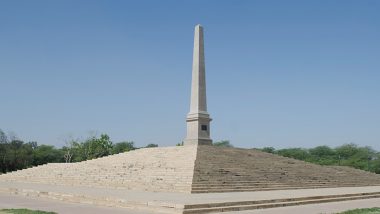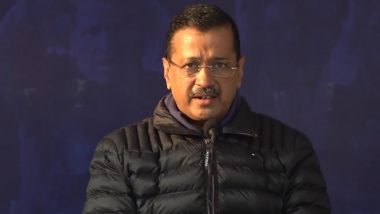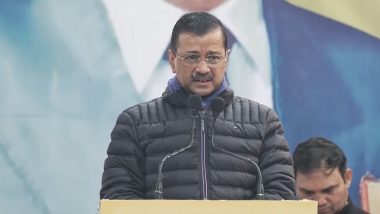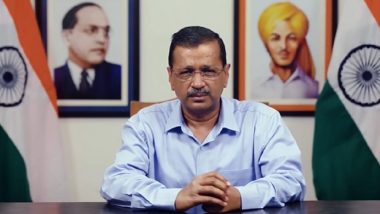New Delhi, September 27: Overgrown vegetation, lawns and pathways around the iconic Coronation Pillar and Raj-era statues flooded with rain water -- the sight at a historic park here, where 'New Delhi' was born in 1911, is anything but visitor-friendly.
The place holds great historical significance as the third Delhi Durbar was held on this very site, where King George V and Queen Mary were coronated as the emperor and the empress of India on December 12, 1911, and the British monarch had also announced the shifting of the capital from Calcutta to Delhi.
On World Tourism Day on Monday, the towering obelisk with a flight of stone steps lay surrounded with thick overgrown vegetation and stagnated rain water, turning the once verdant lawns into practically a swampland. World Tourism Day 2021: Know Date, Theme, History, Significance and Objectives Behind the International Day.
The marble-made grand statues of King George V and of the four Viceroys, Lord Hardinge, Lord Willingdon, Lord Irwin and 9/27/2021 4:49:51 PMLord Chelmsford, stood stoically amid a mess created by the monsoon rains, which on few days in the recent past had caused massive waterlogging in various parts of Delhi with record rainfall.
To make matters worse, heritage enthusiasts and other people visiting the historic Coronation Park in north west Delhi's Burari area, were not allowed to enter the park on Sunday by security guards, who cited "lodging of paramilitary personnel" on its premises as the reason.
The massive heritage site falling under the Delhi Development Authority, sits next to Burari grounds, also owned by the DDA, where a large number of farmers protesting against the new farm laws, had earlier camped amid heavy security deployment. The main farmer protests are happening at Delhi border areas.
The security guards on duty at the Coronation Park said that visitors are not being allowed for a long time as paramilitary personnel are lodged in a building on its premises. However, a senior official of the DDA, when contacted, said, "No such official order has been issued. The park is open to public." On December 15 last year, PTI had reported a similar hardship faced by visitors who were turned away by guards citing the same reason.
"The lawns of the park are open to the public. It is a public park and meant for them only. We will convey it to the ground staff, to not stop anyone from entering the park. There should be no confusion," a senior DDA official had then said. Delhi-based heritage enthusiast Astha Khanna, 25, went to the park on Sunday but returned with an unpleasant experience.
"The guards did not let us enter and when we asked them to show an official order on it, they said, there wasn't any. For whatever reason entry is being restricted, people have the right to know it via an official written communication," she said, adding that after much waiting and pleading, she was allowed to see the park for just 10 minutes.
Khanna, who promotes heritage of India through her social media page, said she felt sad to see the "birthplace of Delhi in shambles". "The state of the Coronation Park was already not the best earlier but one can see the condition of the place has worsened considerably since the first COVID-induced lockdown," she rued.
A security staff on duty said the level of stagnated water was much higher a few days ago and pumps have been deployed to drain out the water in a low-lying area. Two more Delhi Durbars have taken place at this site in 1877 and 1903, and the place was given the shape of a park after Independence. For decades, it was termed a "graveyard of statues" as iconic Raj-era statues were unceremoniously dumped here post 1960s where they were subjected to defacement and decay amid thick vegetation.
The Coronation Pillar is a monumental obelisk that commemorates the Delhi Durbar of 1911, marking the exact site where the king and the queen had sat in that historic day. The heritage park saw decades of neglect until it was taken up by the Sheila Dikshit regime to be redeveloped, and work was to be completed by 2011 to coincide with New Delhi's 100th anniversary.
But the DDA, after missing several deadlines since then, has only managed to landscape the area, even though the grass has lost its sheen, while the history walls erected in front of the statues of the four viceroys lie neglected, incomplete and defaced.
US-based researcher and author of Calcutta's Edifice: The Buildings of a Great City, Brian Paul Bach recalled his first visit to the site in 1988, followed by two more visits in 1991 and 2011, and said this places holds "great potential" as a tourist attraction for both local and foreign visitors.
"This is such a specialised site, it should be made known and fixed up but kept simple, and in time, it will be more appreciated, like Lodi Gardens or Safdarjang Tomb. It just needs tender loving care in a low-key manner," he told PTI. World Tourism Day 2021– 7 Evergreen Tourist Places That Are Definitely on Everyone’s Bucket List.
He said when he first visited the place, it was very rural yet it seemed intact, and of course the "obelisk was prominent". "I have pictures with me from my first and third visits with my wife," he said. As per the redevelopment plan, a 'Freedom Plaza' was planned with a towering flagpole to hoist a tricolour but the work is still far from complete.
Khanna said the place should be conserved not just because of the history but also as a "tourism destination" that can generate revenues for the government. Meanwhile, the sprawling park, often termed a "sanctuary of the discarded Raj-era statues", awaits visitors and perhaps redemption.
(This is an unedited and auto-generated story from Syndicated News feed, LatestLY Staff may not have modified or edited the content body)













 Quickly
Quickly





















